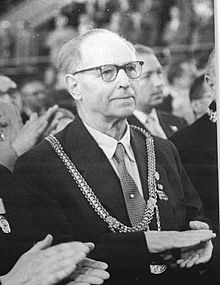Max Volmer
| Max Volmer | |
|---|---|
 |
|
| Born | 3 May 1885 Hilden |
| Died |
3 June 1965 (aged 80) Potsdam |
| Nationality | German |
| Fields | physical chemist |
| Notable awards | Hervorragender Wissenschaftler des Volkes |
Max Volmer (German: [ˈfɔlmɐ]; 3 May 1885 – 3 June 1965) was a German physical chemist, who made important contributions in electrochemistry, in particular on electrode kinetics. He co-developed the Butler–Volmer equation. Volmer held the chair and directorship of the Physical Chemistry and Electrochemistry Institute of the Technische Hochschule Berlin, in Berlin-Charlottenburg. After World War II, he went to the Soviet Union, where he headed a design bureau for the production of heavy water. Upon his return to East Germany ten years later, he became a professor at the Humboldt University of Berlin and was president of the East German Academy of Sciences.
From 1905 to 1908, Volmer studied chemistry at the Philipps University of Marburg. After that, he went to the University of Leipzig, where he was awarded a doctorate in 1910, based on his work on reactions in high vacuums. He became an assistant lecturer at Leipzig in 1912, and after completion of his Habilitation there in 1913, he became a Privatdozent at the University.
In 1916, Volmer went to work on military-related research at the Physical Chemistry Institute of the Friedrich-Wilhelms University (today the Humboldt University of Berlin). From 1918 to 1920, he conducted research in industry at the Auergesellschaft in Berlin. In 1919, he invented the mercury steam ejector, and he published a paper, with Otto Stern which resulted in the attribution of the Stern–Volmer equation and constant. Also attributed from his work during this time is the Volmer isotherm.
...
Wikipedia
